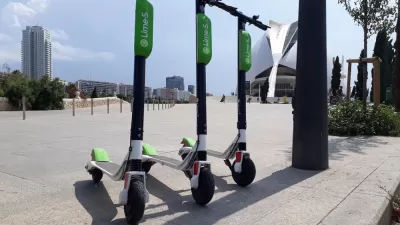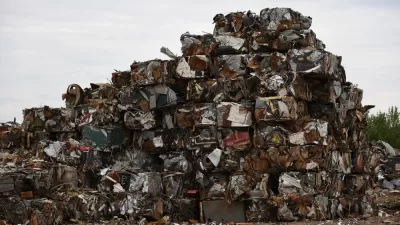Houston's 14 percent recycling rate is downright dismal (San Francisco's is 80 percent). The city's entry in the Bloomberg Philanthropies' Mayor's Challenge seeks to change this by taking the onus off of individuals to decide what's recyclable.
Ariel Schwartz reports on Houston's Total Reuse initiative, a program that pulls together existing technologies to create a new paradigm in waste disposal. If the project is successful, it could raise that dismal recycling rate to 75 percent.
"Instead of trying to overhaul local culture and regulation, the city is working on an ambitious plan to build the first total material resource recovery facility--an innovation that would allow residents to toss all their trash into a single bin, let technology to do all the sorting, and emerge in the end with usable products," says Schwartz.
Based on extensive research into what other metropolises have implemented, Laura Spanjian, Houston’s sustainability director, developed a system that "combines many of these technologies: It would take everyone’s trash in one bin and send it to a facility that pulls out every piece of recyclable material and separates out food waste. Recyclable commodities would be sold, and food waste would be turned into compost or put in an anaerobic digester to power facilities or trucks. Another portion of the waste would be turned into gasoline."
"Spanjian says that she would be thrilled if Houston won the $5 million Mayor’s Challenge, but that the process is going ahead regardless. 'Having the grand prize money would help us go faster, help us implement to initial pieces that much quicker,' she says. 'But we’re on a path to implement this.'"
FULL STORY: Houston’s Plan To Make Landfills Extinct

Planetizen Federal Action Tracker
A weekly monitor of how Trump’s orders and actions are impacting planners and planning in America.

Map: Where Senate Republicans Want to Sell Your Public Lands
For public land advocates, the Senate Republicans’ proposal to sell millions of acres of public land in the West is “the biggest fight of their careers.”

Restaurant Patios Were a Pandemic Win — Why Were They so Hard to Keep?
Social distancing requirements and changes in travel patterns prompted cities to pilot new uses for street and sidewalk space. Then it got complicated.

Platform Pilsner: Vancouver Transit Agency Releases... a Beer?
TransLink will receive a portion of every sale of the four-pack.

Toronto Weighs Cheaper Transit, Parking Hikes for Major Events
Special event rates would take effect during large festivals, sports games and concerts to ‘discourage driving, manage congestion and free up space for transit.”

Berlin to Consider Car-Free Zone Larger Than Manhattan
The area bound by the 22-mile Ringbahn would still allow 12 uses of a private automobile per year per person, and several other exemptions.
Urban Design for Planners 1: Software Tools
This six-course series explores essential urban design concepts using open source software and equips planners with the tools they need to participate fully in the urban design process.
Planning for Universal Design
Learn the tools for implementing Universal Design in planning regulations.
Heyer Gruel & Associates PA
JM Goldson LLC
Custer County Colorado
City of Camden Redevelopment Agency
City of Astoria
Transportation Research & Education Center (TREC) at Portland State University
Camden Redevelopment Agency
City of Claremont
Municipality of Princeton (NJ)





























